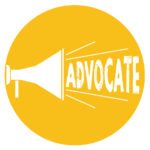
A recent question within the Hidden Heroes Caregiver Community generated a lot of responses and ideas: How do I start advocating?
I, like many caregivers started by advocating for my husband within his treatment plan. Then, over time I branched out to share what I knew with others and eventually became a Caregiver Fellow with the Elizabeth Dole Foundation. I have been able to share not only mine and my husband’s story, but the stories and concerns of others. It is my way of giving back and saying thank you to the numerous people who have and continue to help us on our journey.
One of the Fellows, Jennifer Mackinday said it best, “Advocates should strive to Educate, Engage and Empower.” Always remember to be respectful of yourself, your wounded warrior, other caregivers and organizations.
When you first start to advocate, you don’t need to start your own nonprofit. Instead use your energy and resources and take a look at the thousands of already established veteran nonprofits and advocacy groups. If you don’t know where to start, check out The National Resource Directory and look for non-profits there. Also, many of our Coalition Members are nonprofits themselves and may need additional help.
A great example of how to support already established nonprofits is the Elizabeth Dole Foundation. The Foundation-commissioned RAND study has provided many direct-service nonprofits and other military service organizations with the knowledge that was needed to help them effectively include military caregivers in many of their programs. The results can be seen in the new and expanded coalition programs introduced since the report, such as the U.S. Chamber of Commerce – Hiring our Heroes, which now includes military caregivers in their hiring fairs. You may not be able to commission a study, but your feedback of what works and what doesn’t work, and what is most needed for caregiver programs is extremely important.
Colleen K. Saffron’s advice is that one should first start volunteering and being involved in small actions. This allows an organization to know that you’re reliable, credible and have viable solutions. She also recommends watching how you behave on social media, and to be constructive and respectful when talking about bigger organizations, including those which may be involved in the treatment of the wounded warrior. This can be one of the hardest parts – to not constantly criticize.
Others caregivers, such as Jeannette Davidson-Mayer started by “talking to my Governor and other State elected officials.” Consider providing them with short e-mails or letters stating your position and/or problem and possible solution (if you have one), being sure to include corresponding bill numbers if it is in regards to legislation.
One of the topics addressed at the Impact Forums in February was community support, which focused on how to enable local Veteran Service Organizations (VSO), nonprofits, unions, businesses and individual Americans to support caregivers in their communities. Caregivers can play a role in organizing this support, as Melissa A. Johnson recommends. She said, “Talk to local VSOs and attend any local events they have, along with events held at the VA. You can gain a wealth of knowledge and make good connections.”
The idea of believing in the mission of the non-profit that you may be working with, was suggested by Elizabeth A. Ray. It is an ugly side to advocacy, but there are unsavory individuals out there who have their personal interest at heart and end up hurting others. Just remember to check out the background on any organization and ask around.
Like many other events in one’s life, becoming an advocate is a journey. Together as a community, we can help others along the way, uplift one another and work towards our common goal of bringing about greater awareness of Military Caregivers and finding viable solutions to help everyone within our community and beyond.
If you or anyone you know would like to join EDF’s Hidden Heroes Caregiver Community please e-mail Emery@ElizabethDoleFoundation.org
- Emery Popoloski
Hidden Heroes Caregiver Community Program Coordinator












Follow Us